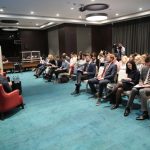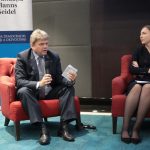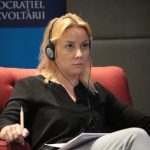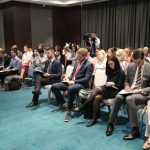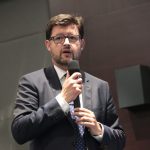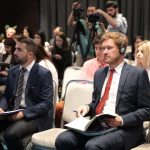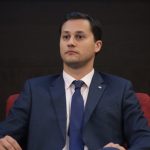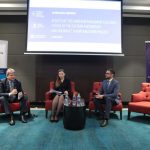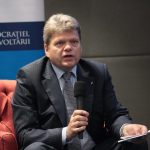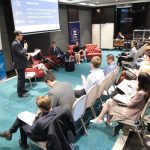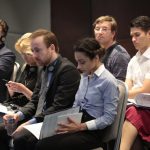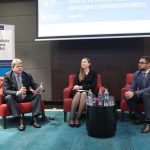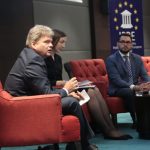IPRE’s International Conference: Results of the European Parliament Elections and their Impact on the Future of the Eastern Partnership – How could we secure the Europeanization process of the Republic of Moldova?
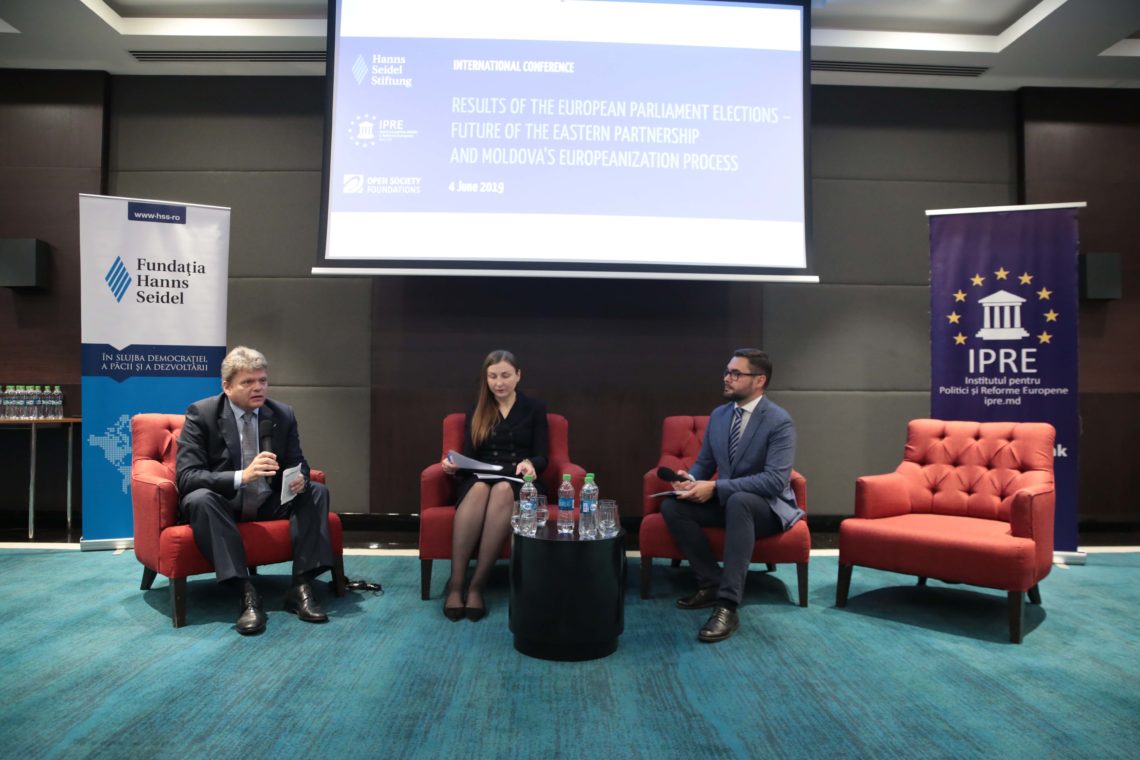
The Institute for European Policies and Reforms (IPRE), in cooperation with and with the support of the German Foundation Hanns Seidel and the Open Society Initiative, organized on the June 4th, 2019 the international conference “Results Of The European Parliament Elections – Future Of The Eastern Partnership And Moldova’s Europeanization Process”.
The event was attended by national and international experts, diplomats and officials, as well as by representatives of the civil society and mass-media from the Republic of Moldova. The participants discussed the results of the European Parliament elections that took place on the 26th of May 2019 and these results’ possible impact on the new EU Strategic Agenda for the neighborhood countries. Additionally, special attention was paid to the reflections on the future of the Eastern Partnership, also in the context of the current challenges for the Europeanization process of the Republic of Moldova.
The conference was opened by Iulian Groza, IPRE Executive Director, who noted: “On the one hand, the current political situation is very tumultuous, on the other hand, it offers opportunities and certainly the European Parliament elections that took place last week, are very important not only for EU policies but also because they will have an impact on EU foreign policy, the Eastern Partnership and the future of Moldova. This is precisely what we have planned for today at this conference – to discuss the impact of these elections, but also to analyze the process of Europeanization.”
In his turn, Daniel Seiberling, Head of the Hanns Seidel Regional Representation in Ukraine, Romania and the Republic of Moldova, said: “What is happening in these weeks, especially given the recent developments proves that some decisions have to be taken. We continuously analyze the results of the European Parliament elections and we noticed a major change in the situation, which will have an impact on the policies in Brussels. If previously it was clear who have won the elections, this time it was not clear and it is a good sign for the democratization of the European process. The high participation rate shows that citizens are interested in EU processes. Young people can be brought as an example. They have signaled that things on the inside have to be changed, especially with regard to climate change. Also, when we talk about the Eastern Partnership countries, we see the political changes taking place here and we are confident that at this level too, EU policy will change in the near future. “
“High participation in parliamentary elections shows that European citizens want to be more directly involved in European policy making, so that they could have a greater impact in all of the EU countries. Thus, the next European Parliament will be more representative and will reflect better the voice and opinions of citizens. We have carefully followed the results of these elections and have seen those paradigms between the Euro-skeptic and populist parties and the fact that they have not taken many mandates shows that European citizens need a continuety for the EU. For us, it is important to see what coalitions will be formed in the new Parliament and how the priorities and dimensions of work with the Eastern partners will be framed” said Daniela Morari, State Secretary, Ministry of Foreign Affairs and European Integration.
The first panel, moderated by Florent Marciacq, Deputy Secretary General & Research Fellow, Austro-French Centre for Rapprochement in Europe (ÖFZ, Vienna) was dedicated to the analysis of the recent parliamentary elections and the impact they may have on the new strategic agenda of the EU. In this panel, Erik Sportel, Senior Programme Manager, Centre for European Security Studies (CESS), Groningen; Wouter Zweers, Junior Researcher, Clingendael Institute, the Hague; and Mihai Mogildea, Associate Expert, Institute for European Policies and Reforms (IPRE), Chisinau, analyzed from their perspective the current situation and of the future structure of the European Parliament.
“It is no secret that there are a lot of problems in the Republic of Moldova that are not related to the great politics. The parties have to move away from the discourse promoted before the parliamentary elections and look for the the opportunity to form a coalition through negotiations” said Erik Sportel.
In turn, Wouter Zweers noted that the pro-European forces in the Republic of Moldova must look at the EU or Russia not only from the political side, they must join the discussions in Europe on migration, the climate, the internal market and social security as soon as possible, because this leads to Europeanisation and to benefits for the citizens.
The second panel, moderated by Andrei Popov, President of the Institute for Strategic Initiatives in Chisinau, was aiming to discuss recent developments in the Eastern Partnership and the securisation of Moldova’sEuropeanization process. The panel’s speakers were: Cristina Gherasimov, Research Associate, Robert Bosch Centre for Central and Eastern Europe, Russia, and Central Asia, German Council on Foreign Relations (DGAP), Berlin; Angela Gramada, President, ESGA, Bucharest; Sarah Pagung, Programme officer, Robert Bosch Center for Central and Eastern Europe, Russia, and Central Asia, German Council on Foreign Relations (DGAP), Berlin; and Adrian Lupușor, Executive Director, Expert-Grup, Chisinau.
For more details, the video recording of the conference is available here.
The Conference is organized within the project „EU Debates Cafe: Advancing the Knowledge and Expertise about EU’s Institutions and Policies in Moldova”, implemented by the Institute for European Policies and Reforms (IPRE), in cooperation and with the support of Hanns Seidel Foundation. The event also benefits from expert contributions provided within the Project: “Establishing Policy Bridges with EU”, implemented by IPRE with a grant offered by the Open Society Initiative for Europe.


